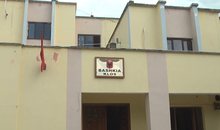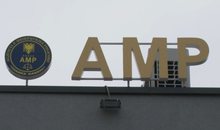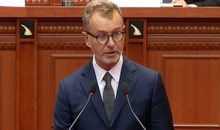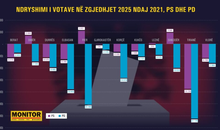
 Flash News
Flash News
Video/ Revolt in Corfu prison, Albanians and Georgians set fire to cells
Accident at "Shkalla e Tujanit" in Tirana, a car overturns after the collision
KPA dismisses Tirana judge Ardiana Bera from office
Don't lose face/ After Rama's 'threat', SP candidates withdraw request from CEC
VIDEO/ The assassination in Durrës, the moment of the murder of 29-year-old Ermir Dedja
Work informality is increasing in Albania, the highest concealment of real wages in the region

Unofficial work (unpaid work, or higher wages than declared) has increased in five of the six Western Balkan countries in the period 2016-2019, with the exception of Serbia, according to a recent report by the SELDI-Europe network Southeast for Leadership, Development and Integrity.
The highest level of work informality is in Kosovo, with 83% in 2019 (from 81% in 2016), followed by Bosnia and Herzegovina, with 48% (from 37% in 2016). Third is Albania, with an indicator of job informality of 47%, from 39% in 2016. Serbia is the only country that has recorded a decline in hidden employment levels since 2016 (by 5.7 points percentage to 46%).
The highest increase in work informality during this period was recorded in Northern Macedonia, from 30 to 42%, while in Montenegro it went to 41%, from 39% in 2016.
According to the report, working without an employment contract or receiving a higher reward than claimed in the employment contract both reflect the presence of hidden employment.
The percentage of those who work without a contract is the highest in Kosovo (25%). For the practice of concealing the current salary, Albania ranks first with almost half (46%) of all respondents engaged in a main job reporting that they work without having a contract at all or receiving a part of the salary informally.
This shows that while the nature of the contractual agreement (or lack thereof) varies between countries, they all have a high percentage of undeclared work, and even the lowest percentage in Northern Macedonia (27%) exceeds a quarter of that. all employees in one job, the report said.
Due to the high level of concealment of real wages, Albania also has the highest ratio of hidden practices in social insurance coverage for 2019. 34% of respondents reported that insurance is paid for lower wages than not that actually take. After Albania, this indicator is higher by Serbia and Northern Macedonia with 27%.
According to the report, covert practices related to social security include employees, who either do not pay any contribution, or are paid only on the basis of a "formal" salary lower than the real one. The results of the survey on these practices naturally reflect the indicators of undeclared work, as social security coverage is closely linked to the employment contract.
Sektori më i prekur nga ekonomia e fshehur në rajon është bujqësia. Kjo është veçanërisht e vërtetë për Shqipërinë, Serbinë dhe Bosnje-Hercegovinën. Më pas renditen pasuritë e paluajtshme, tregtia me shumicë dhe ndërtim.
Sektori i shërbimeve (kryesisht restorantet, hotelet, transporti dhe tregtia) është gjithashtu i prekur nga informaliteti. Në Shqipëri, sektorë të tjerë të prekur janë industria e këpucëve dhe veshjeve, minierat dhe prodhimi.
Sektori i modës, i cili ka ndikim të rëndësishëm në punësim dhe ekonomi, ka gjithashtu nivele të konsiderueshme informaliteti.
Në Maqedoninë e Veriut, pagat në zarf gjenden kryesisht në industrinë e ndërtimit. Megjithatë, rastet e shpeshta mund të gjurmohen edhe në bujqësi, hotele, kafene dhe restorante.
According to 45.7% of businesses in Northern Macedonia and 72.9% in Albania, corruption is the most important factor for the existence of a hidden economy.
This leads the public to believe that taxes are not used properly for high quality public services.
The 2019 Open Budget Survey confirms that the general public in the region lacks accessible information on the ways in which their governments collect and spend national budgets.
High tolerance for tax evasion and social security contributions has been cultivated in the Western Balkans due to the perception that tax authorities and the public system in general are corrupt, the report said. / Monitor
Latest news








38 people arrested for conspiracy in Venezuela, among them an Albanian
2025-05-20 21:18:15

Torrential rainfall hits southeastern France, 3 confirmed victims
2025-05-20 20:49:14

Shehaj: Our votes will never unite with Edi Rama
2025-05-20 20:24:31
The ship "Butrinti" rescues 13 migrants in the Aegean Sea, including 2 children
2025-05-20 20:01:12
Video/ Revolt in Corfu prison, Albanians and Georgians set fire to cells
2025-05-20 19:51:04
Biden diagnosed with cancer, questions about his health in the White House
2025-05-20 19:37:01



How SP candidates withdrew from vote complaints after Rama's message
2025-05-20 18:34:12
Trump-Putin conversation/ Analysis: Who won in the two-hour call?
2025-05-20 18:15:00
Suspicions of electoral crimes, SPAK checks the municipality of Klos
2025-05-20 18:02:48
Vucic message to the Serbian coach: Go to Tirana and win against Albania
2025-05-20 17:50:48
Këlliçi: The diaspora vote is a massacre, the violations are flagrant
2025-05-20 17:39:37
Accused of drug trafficking in Italy, the Supreme Court acquits Kreshnik Farruku
2025-05-20 17:20:53

Venezuelan President: Ecuador's Albanian Mafia seeks to sabotage our elections
2025-05-20 17:01:14
Accident at "Shkalla e Tujanit" in Tirana, a car overturns after the collision
2025-05-20 16:51:18
Diaspora vote, Source: Process more symbolic than with real impact
2025-05-20 16:41:12
Why Careful Reporting on Tragic Cases Is Important
2025-05-20 16:17:12
KPA dismisses Tirana judge Ardiana Bera from office
2025-05-20 16:13:30
Even young people with hypertension, 35% of 18-year-olds with blood pressure
2025-05-20 16:01:07


Enigma/ How did the SP grow more than in the previous elections this year?
2025-05-20 15:12:50
Threat against President Osmani, KMDLNJ: Risk to security and democracy
2025-05-20 15:01:56

Hungary's parliament approves withdrawal from the International Criminal Court
2025-05-20 14:50:00
Defamation lawsuit against Albana Vokshi, hearing postponed at the GJKKO
2025-05-20 14:36:20
Names/Who are the 140 MPs who will sit in the Assembly?
2025-05-20 14:21:57
Why don't young people want to get married anymore?
2025-05-20 14:15:27
EU approves new sanctions against Russia
2025-05-20 13:49:54
Flax seeds, positive and negative effects of their consumption
2025-05-20 13:45:54

Pope Leo XIV's house goes up for auction for $250,000
2025-05-20 13:23:49

Don't lose face/ After Rama's 'threat', SP candidates withdraw request from CEC
2025-05-20 13:02:09
Berisha warns Rama: You will not stay in power with this farce
2025-05-20 12:55:00



RTSH's official website hacked, fake news about Kosovo appears
2025-05-20 12:10:17

Accident in Korça, motorcycle collides with car, 45-year-old injured
2025-05-20 11:44:48


Germany/ 46-year-old Albanian injures three people, including an 11-year-old
2025-05-20 11:12:01
What does the agreement between Britain and the EU contain?
2025-05-20 11:01:38


Kosovo bans chicken imports from Brazil
2025-05-20 10:33:45
Makinën plot me d*ogë, vihen në pranga dy persona në aksin “Mamurras-Kashar”
2025-05-20 10:23:33
How does speaking multiple languages change the brain?
2025-05-20 10:15:05
Photo/ This is the 29-year-old who was executed in Durrës
2025-05-20 10:00:39
Foreign exchange/ How much foreign currencies are bought and sold today
2025-05-20 09:51:04




Discover the main signs that indicate your body lacks vitamin D
2025-05-20 09:06:39

Horoscope, what do the stars have in store for you today?
2025-05-20 08:50:06

He was executed by masked men, who is the 29-year-old who was killed in Durrës?
2025-05-20 08:28:21
Assassinations in Durres, 29-year-old executed
2025-05-20 08:14:59
Clear skies and light clouds, this is the weather forecast for Tuesday
2025-05-20 08:05:40
Posta e mëngjesit/ Me 2 rreshta: Çfarë pati rëndësi dje në Shqipëri
2025-05-20 07:50:55
"We broke a myth", Shabani: The Shehaj-Lapaj debate also harmed us
2025-05-19 22:59:18




Shkullaku: With the vote of the diaspora, a slaughterhouse has been created
2025-05-19 21:46:19
CEC orders recount in 2 polling centers in Elbasan and Durrës
2025-05-19 21:33:47

250 euros a night for virtual clients, online prostitution discovered
2025-05-19 21:17:10
Yrshek, 15-year-old hits and kills an elderly man
2025-05-19 21:07:05

Adoption in Albania: The system that "holds" abandoned children hostage
2025-05-19 20:52:27

Counting for preferential vote in Tirana ends, Xhaçka receives mandate
2025-05-19 20:23:22
Kosovo President Vjosa Osmani receives death threat
2025-05-19 19:47:49



Safet Gjici's release, lawyer: Today the true face of justice was seen
2025-05-19 19:02:46

King Charles writes to Biden after being diagnosed with cancer
2025-05-19 18:34:07

Ceasefire in Ukraine, Trump holds phone conversation with Putin
2025-05-19 18:24:47
